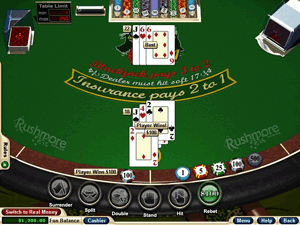 Match play 21 is a variation of blackjack that is played with eight decks of cards. Unlike regular blackjack, however, the decks are not full decks of cards. Instead, the tens are removed from each deck, so that there are 48 cards per deck, as opposed to 52 cards in each deck. In match play 21, the dealer is required to hit when they hold a hand that is valued at a soft seventeen or lower. In addition to these changes, in Match Play 21, the deck is shuffled after each hand. In normal blackjack, the dealer shuffles after the shoe has been played through.
Match play 21 is a variation of blackjack that is played with eight decks of cards. Unlike regular blackjack, however, the decks are not full decks of cards. Instead, the tens are removed from each deck, so that there are 48 cards per deck, as opposed to 52 cards in each deck. In match play 21, the dealer is required to hit when they hold a hand that is valued at a soft seventeen or lower. In addition to these changes, in Match Play 21, the deck is shuffled after each hand. In normal blackjack, the dealer shuffles after the shoe has been played through.
When playing match play 21, a player should follow the optimal strategy chart. However, following the normal blackjack chart for optimal strategy is not suggested, considering the game is played without the tens in the deck. Thus, there are 32 less cards in the deck, all of which have a value of ten. When playing match play 21, a player should split twos and threes when the dealer shows an up card of an eight or less. Players should not split fours or fives. When dealt a pair of sixes, the player should split when the dealer shows four, five, or six. When holding sevens, split when the dealer has a two through seven. Eights should be split in all instances, except when the dealer holds an ace. Nines should be split, except when the dealer holds a two, seven, ten or ace. During these instances, the player should stand. Aces should always be split in match play 21.
When doubling down in match play 21, a player should double down with a hard nine only if the dealer shows a six. When holding a hard ten, players are wise to double down when the dealer shows a two through eight. When a match play 21 player holds an eleven, he should always double down on his bet. There are some soft hands that should be doubled down with in match play 21 as well. A player should double down if he holds a soft fifteen and the dealer shows a six. When holding a soft sixteen, doubling down is correct if the dealer’s up card is a five or six. If the player holds a soft seventeen or eighteen, then doubling down is the right move if the dealer shows a four, five, or six.
In match play 21, a player may also choose to surrender, though surrendering is rarely the correct course of action. A match play 21 player should surrender if he holds a hard or soft sixteen and the dealer shows an ace. Additionally, surrendering is the correct course of action if the player holds a hard seventeen and the dealer has an ace showing.



